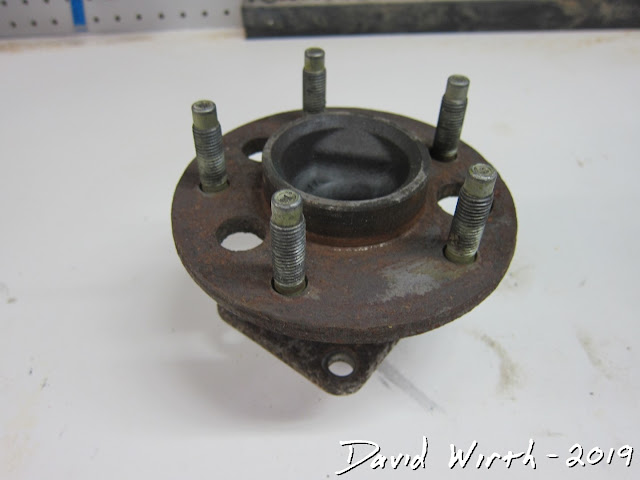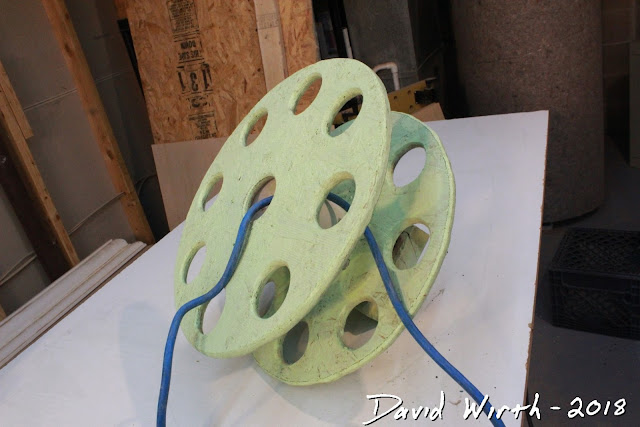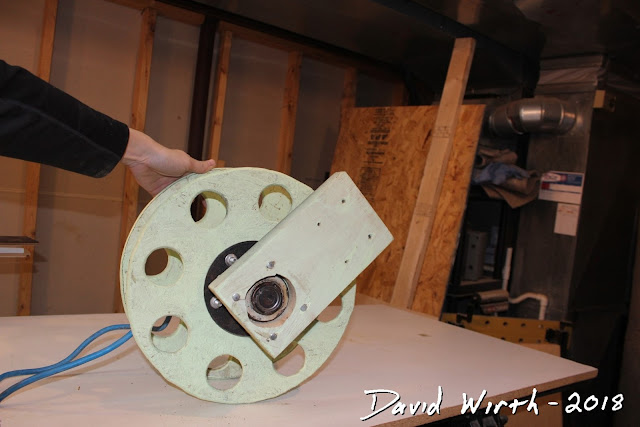Extension Cord Reel - Easy Build Plans
I am continuously trying to improve my basement shop. Whether it's with new tools:
-table saw
-miter saw
-homemade disc sander
Or whether it's with things i build to help organize:
-nail gun case
-organizer cart
The next thing that i've noticed to be a problem is a convenient extension cord. In the past every time i needed to plug something in i had to take down the orange extension cord from the peg board, unwind it, and plug it in. Then when i'm done with the tool i need to rewrap it and hang it on the board. It was a pain.
Last Christmas i got an extension cord that attaches to the ceiling in the garage. It's spring loaded and will automatically reel back up into its housing. I use it all the time in the garage.
The one in the garage cost around $40 and is quite big. I didn't really feel like buying one and if i hung that from the ceiling in the basement i would constantly be hitting my head on it. I wasn't 100% sure where i even wanted to mount it in the basement. The ceiling was convenient in the garage, but perhaps on the wall or under the workbench would be better for the basement.
So i started with some sketches on paper as usual.
I quickly realized that the complicated part of the reel is winding up a cord and not having the plugged in end become all twisted. I'm guessing that with the store bought extension cord reels there is some sort of fancy roller bearing mechanism that can rotate without becoming twisted.
Eventually i came up with a design that involved the plugged in end of the cord to come out the center of the reel. I still wasn't super comfortable with the design, but i thought it would work well enough.
I decided to make the 'wheels' out of OSB, a material that i have used a lot recently. I built the nail gun case and cart organizer out of that type of wood.
For the spinning/rotor part of the reel i used something i just had lying around, the old hub from my car. A week earlier i replaced one of the rear hubs off my Pontiac Grand Prix.
The old one wasn't broken, just the ABS sensor was cracked. It was a little overkill but i thought it would work. If it can hold up 1/4 of a 2000 lb car, it should be able to hold up a 4 lb extension cord.
For the center of the reel i wanted to use a short piece of PVC pipe. A 3" diameter pipe was perfect, and i was able to drill a large hole in it for the extension cord to pass through. The only difficult part was in how i was going to attach it to the wood.
But here's all the materials i needed set out. I also wanted to use a scrap piece of 2"x6" pine for the mount. Something that i could bolt to the hub and screw to whatever i was going to hang it off of.
I started by cutting out the 2 circular ends of the reel. Also i decided that cutting some holes in the ends would be functional for a couple of reasons. Mainly it would provide a type of handle for me to spin the reel. I couldn't really attach a handle, your arm would hit the end of the extension cord coming out of the center of the reel. But by adding holes it gave me something to grab onto.
Mount PVC to wood with mechanical rivets.
I rounded over the wheels and the cut-out holes with the router. Just a simple round-over bit to remove the sharp edges.
Next i measured, marked and drilled out the holes to attach the hub.
At this point i still wasn't sure how i was going to attach the PVC center piece to the wood ends. Ultimately i decided to make some small metal 90degree brackets and rivet them together. I'm still not happy with how that part turned out, but i still have no better way of connecting them.
In order for the hub to fit flush with the 2x6 i had to cut out a circular section. Then i drilled 4 holes to attach them together with bolts. With everything bolted together it seemed like it would work ok. Although the steel hub made it overly heavy.
When i plugged it into the ceiling power strip it seemed like it would work fine. But as i started winding the cord onto the reel i realized that there might be a problem. The cord really started to become twisted at the plugged in end. I would have to leave plenty of slack at that end and hope that the constant twisting and untwisting wouldn't damage the wire.
So i stood it back off the ceiling to do the finishing touches. I sanded everything down with the belt sander and palm sander. Then i put 2 coats of some old paint i had lying around and 2 coats of polyurethane.
It was kind of obvious that i didn't need to make the reels that large. I probably could wrap 200 feet of extension cord on the thing. But i only needed around 20 feet. If i had to make another one i would have made the reels a lot smaller.
Just another piece of the puzzle in making the shop easier to work in.
Video Transcript:
so something I made for my workshop a
bunch of years ago and never really
showed anybody how he made it is this is
an extension cord reel and the reason I
never really showed anybody how I did it
was because I never felt like it was
quite done it it works but it's not
perfect it's good for a small shop not
for a big one and I was looking for
something that I could just reel out
like in the garage I have a reel from
the top that I cranked up and cranked
down what's coming up with different
ideas of pipes and wheel bearings and
just last week I changed the rear hub on
the back wheel of my car and this is the
old one and it's spins pretty easily
it's really heavy really heavy duty I
have a quick sketch and I'm just gonna
make it out of oh s bead particle board
because that's what I have lying around
and we'll see how it goes well the first
step is determining how big to make the
circle and this is just scrap I have
lying around that's 16 inches so I'm
think I'm gonna make it 15 and a half
just so I have screw into that center hole and I can
leave that bit right in there so I'm
going to take a sharpie up and draw this
circle it'll hold it right in place and
this will be the 15 and a half inch
circle nose close that I'm going to use
all right there's a the layout lines that I did on the piece
that will attach to the hub this die
outer diameter is this here I'm gonna
cut that out and I just kind of
eyeballed right angles and drew this
pizza shape with the lines here
okay because I'm using such a large bit
it's binding up a little but that gave
me a hint on what I should be doing and
that's drilling halfway through with one
and because the bit sticks out a little
bit the holes are on the other side so I
can cut it from the backside and I won't
get any tear out as you can see from
these holes because I'm coming at it
from both directions that's all the way
through nice clean hole a bit and that's
that and obviously so I don't have to
remeasure redraw anything I'm just using
a sharpie and tracing all the holes that
I already drilled out it's the center
section cut out and I just need to drill
these holes and it will fit right over
that now real quick way that I transferred
the marks from here onto this board I
took a big sharpie and I marked up the
ends of these and I set it on there I
lined it with that center hole and it
took a hammer and when I hit it just
gave faint impressions on here that I
can mark for the holes to be drilled out
and I got five of them alright I just
got done cutting out the holes for the
hub bolts I used a half inch bit and I
had to do it on the drill because the
drill press doesn't have enough of a
reach I was going this will beat the
back and how it will mount to the wall
and then this piece would fit on the
front okay here's the piece of PVC I just cut
out it fits in the center of the hub I'm
gonna mount this here and before I do
that I have to drill a hole in the
center of this PVC so that a cord can go
through come out and come out the front
because that's where I'm going to
connect it it's not a great design I
would have liked to somehow fit the cord
out the back but with this hub there's nowhere to go
and it has to come out of the center
somewhere that way when you wind it up
the inner part doesn't get tangled only
the outer part winds up and just to
knock down some of these sharp edges I'm
using a roundover bit on the router
I had cut out the wheels before I'm the
inner piece with the hole in the middle
where the court is gonna feed through
and out the front but I wasn't sure how
I was gonna attach the wood wheels to
the PVC Center axle and I thought about
it and I came up with just making a
whole bunch of small little right angles
out of steel and then riveting them to
the wood and to the PVC I was thinking
about making out rings and screwing it
together and bolting it together this
just seemed like the the most stable
secure way and then on the back I bolted
the back of the wheel axle to 2x6 which
I will attach to the wall
once again I'm going to feed the
extension cord through the center aisle
at the front that's where it's gonna
plug in and I'll still be able to wind
it up I ended up hanging it from the
ceiling I'm just test fitting it right now I
just have a couple bolts I'm gonna take
it down and sand it and everything but
one bit of a design flaw that I saw was
that this Court is gonna get all twisted
up because it is even though it's
passing through it's gonna be spinning
so I don't know how I'm gonna fix it you
can see it's getting all twisted up here
now it is working for you know I'm never
gonna need to take out more than 2
or so but I'm gonna have to think about
that so I'm happy with where it is on
the ceiling it's high enough up I'm not
gonna hit it but I'm gonna have to worry
about this cord twisting out so far it's
working pretty well I built it because
the cheapest extension cord reel you can
get is probably around 5
one at Harbor Freight the 2
footer it's like 5 isn't cheap but then again
extension cords aren't that cheap
hopefully you can get an old extension
cord and use that the heart of this unit
is an old car hub a wheel bearing right
here out of an old car I changed it on
my Grand Prix and I used this wheel
bearing you don't need something this
heavy duty but this is definitely robust
enough to hold up 2 top of that this this is the mount that
I mount to the joists and the reel
itself is just OSB particle board and a
piece of PVC pipe in the center now the
real reason when I say it's not quite
done it's not quite perfect I'm an
extension cord really you have the one
part of the cord that doesn't move and
the other part that unwinds and
somewhere in that unit there's a 36
swivel that allows electricity flow
through but it doesn't tangle the court
and that's the part I could never really
get over and figure out so when I unroll
this and it unrolls like this part of
this court kind of tank
goes up which is why this is only really
good for about 2 have a 25 foot cord on here and that's
all I really want to use because
otherwise it's just going to tangle up
you'll see when I mounted on the ceiling
but at the center of this this is where
the cord comes out of the middle I
actually have a hole cut in this PVC
pipe which is where this wire feeds
through and you can see as I unwind it
it's actually twisting this cord in the
middle that's it over so to mount the
PVC to the particle board I just used
some metal tabs and I riveted them in
and that's how it's fine and to transfer
the court from the reel off the reel I
drilled a hole in this PVC and it comes
out here so it's still tangling up but
hopefully in just one direction and it
has I'm sure it's maybe shorten the life
of the court but there's no real damage
to it it's just twist it up a little so
let's mount it to joists I'm gonna have
you want to find a spot obviously in the
shop that's in the middle that you can
reach it I use this for the table saw
it's a nice thick extension cord
probably like 12 gauge so it's enough to
handle a big tool I'm gonna mount it to
a joist and then I'll show you how it
winds up and it works so to mount it I
took this bracket off just four bolts
holding it on and I'm just using four
screws now I can lift this up into place
so here it is all mounted in place ready
to go you can see the mount on the
joists I bolted it down here and it's
all wound up and to uh to use it you
just pull the pull the cord down it
unrolls and then to wind it up you just
grab one of the handles and roll it up
now you might be thinking where am I
gonna plug it in well that's where that
lightbulb and all of this comes into
play I'm actually going to install an
outlet box where that light is and move that
down somewhere over here so I'm gonna
have to drill through a bunch of these
joists run a wire put in an outlet box
so I'm going to do that next
well it was just a couple seconds for
you but it took me an hour
a little bit more to replace that light
with an outlet box and move the light
down there but it's all hooked up now
this is connected you can see this is
the extension cord that comes out of the
middle and when I pull it this gets all
twisted up so when I pull the extension
cord down this gets all twisted up and
we have to have a spot for this to be
loose and become twisted so you can have
a hook or something it's always ready to
go it's always plugged in it's out of
the way when you don't need it I use it
all the time I use it for my table saw
which is in the middle of the room any
jig side just pull it down use it wind
it back up it's definitely great to have
in a shop like this and it works great
for a small shop we only need 5 1
at a time you don't need 5
of your garage door or something so if
you have an old car hub or if you have a
junkyard nearby you can use that if not
you can use any small wheel bearing this
isn't much weight but the hub is
definitely I mean I think I could hang
from this thing and it wouldn't go
anywhere that's how solid the hub is so
let me know what you think hopefully you
like it let me know if you have an idea
for how to get that swivel so I don't
get that cord twisting up like this there's got to be
some sort of swivel out there that will
allow that I've never found it though so
let me know what you think
























No comments:
Post a Comment